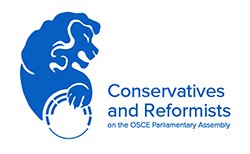 BELARUS During the OSCE PA Winter meeting in Vienna the Swedish delegation on the 23rd of February arranged a side event on The Human Rights Situation in Belarus – A Struggle for Democracy. These are the introductory remarks by the head of the Swedish delegation Björn Söder.
BELARUS During the OSCE PA Winter meeting in Vienna the Swedish delegation on the 23rd of February arranged a side event on The Human Rights Situation in Belarus – A Struggle for Democracy. These are the introductory remarks by the head of the Swedish delegation Björn Söder.
Good afternoon and warmly welcome to this side event hosted by the Swedish delegation. My name is Björn Söder and I serve as Head of the Swedish delegation. The theme of this side event is “The human rights situation in Belarus – a struggle for democracy”. We have almost a full room here today which makes me very happy since we are here to discuss something as important as democracy in Europe, and in turn also the cruel treatment of people in dictatorial and authoritarian countries such as Belarus.
Before we start talking more about the human rights situation in Belarus, I would like to shortly introduce our speakers at this event. We are delighted to have Sviatlana Tsikhanouskaya here today to join us for this side event. Tsikhanouskaya is the leader of the political opposition in Belarus and also the leader for the democratic movement in Belarus. When we are discussing human rights and political issues in Belarus, we could not have asked for a more merited speaker to join our event.
With ample experience of the oppression of the political opposition in Belarus and the situation for the Belarusian people, Tsikhanouskaya will be able to give us better insights into the atrocities committed by the Lukashenka regime for now almost 30 years. I hope also that the insights Tsikhanouskaya will provide will be a good opportunity for us all in the OSCE PA to truly reflect on what we as an organization can do to improve the conditions of the lives of the Belarusian people.
Today I am also very honored to welcome congressman Steve Cohen from the United States, who is also the OSCE PA’s Special Representative on Political Prisoners. In Belarus we have seen how the political opposition has been imprisoned by the Lukashenka dictatorship to further consolidate power. This is an outrageous violation of the intrinsic political rights of the people and an important subject to not forget.
We want to with this seminar highlight these atrocities and spread the knowledge so that we can take action against the oppression. Therefore, we are delighted that congressman Cohen can be here and take part in the discussion of the human rights situation in Belarus, a country where thousands of political oppositions have been imprisoned.
I will also take this opportunity to strongly condemn the Belarusian involvement in Russian war against Ukraine and its logistical components. The Belarusian regimes strong bonds and loyalty with Kremlin have made the people subjected to an unwanted and illegitimate war of aggression that holds no international legitimacy, and risks the European security order at large.
The civilian society in both Ukraine and Belarus are now at risk of loosing any hope of democracy. Therefore, it is extremely important for us, not directly subjected to Russian aggression, to show our support for the people of the two countries. Because even if we are not directly involved, this is also our fight to stand up against tyranny and dictatorship.
We need to show as individual countries, and as an international organization, that the values of peace and democracy are under no circumstances anything we can negotiate about. Instead, they are values that we actively need to fight for and not take for granted, because as we can see they are not something all leaders of the world agree on.
After having gone through some practical details I will give the floor to Madame Tsikhanouskaya who then will be followed by Congressman Cohen. After having heard from the two speakers, we will open up the floor to all of you, our distinguished delegates, that will be able to provide your reflections regarding the human rights situation in Belarus.
After our discussion, the word will go to my colleague Johan Büser who is the deputy head of the Swedish OSCE delegation and rapporteur of the third committee. Johan will provide us with some concluding remarks that will round up our seminar. Due to certain time restraints, we will try and keep this session as compact as possible and we will try and end the side-event after one hour. After we have ended, there will be food served for all of you participating in the event. The food will be served outside of the meeting room since it is not allowed to eat in here. With that I am delighted to give the floor to Madame Tsikhanouskaya.



